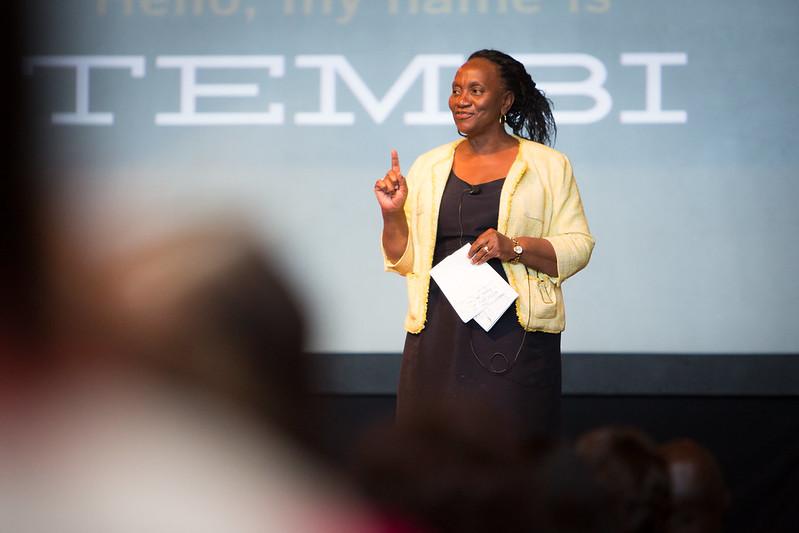Where We Work
See our interactive map


Stembile Mugore presents at IntraHealth's annual SwitchPoint conference. Photo by Ted Richardson for IntraHealth International.
What does this year mean for us? How will we be honored—and how will we honor the profession?
In Florence Nightingale’s day, nursing was a lowly job—but she elevated it. Her working conditions during the Crimea war were deplorable, yet she left a legacy of patient-centered care.
In honor of her 200th birthday this year, nurses should bring about the change we want in order to be proud of our profession and to show the world that we deserve recognition.For almost a quarter of the time since Florence Nightingale’s birth, I have been a student nurse, student midwife, health worker, educator supervisor, trainer, and advocate for the nursing and midwifery workforce in low-, middle-, and high-income countries.
The spotlight on this noble profession provides an opportunity to reflect on what 2020—the Year of the Nurse and Midwife—means to nurses and midwives all over. How will they be honored, and how will they honor the profession?
In all the countries where I have worked, nurses make up the majority of the health workers—and in most cases, they are the only professional health workers at rural health facilities. They often are members of the communities that they serve and express a personal passion to provide health services.
I remember once, I found a four-week-old baby sleeping on the floor in a corner of the nurses’ office. When I asked whose baby it was, the nurse/midwife, who was busy providing antenatal care at the same time, responded, “She is my baby. I could not stay on maternity leave for long because I am the only nurse midwife at this clinic. This community relies on me. I had to come back to work early as the nearest health facility is unreachable for people in my community.”
This underscored what I experience all the time—the dire shortage of nurses and midwives, particularly at rural health facilities.
I have witnessed nurses strike or reluctantly leave their jobs due to poor working conditions and low salaries. The common message from striking nurses or those who have left the health workforce is, “I became a nurse because I loved nursing, but I could no longer afford to feed or pay for my children’s education, so I decided to leave.”
I can name many nurses and midwives who are great leaders. But unfortunately, nurse leaders are still too few. At global, regional, and country levels, nurses and midwives are very under-represented in top leadership positions. They are often absent from big policy and strategy discussions and decisions.
I have held my breath and said to myself, “I could never do your job.”
One nurse leader aptly described it when she said, “Nurses are still perceived as women who are just there to care for patients and take instructions from doctors. We are therefore not often invited to the table where policies are made, even though they affect us.”
Across the globe this year, nurses will celebrate and be celebrated, speeches will be made, stories will be told, and nurses will light up the Florence Nightingale lamp and repeat the nurses’ pledge. There will be a lot of visibility of the nursing profession, including issues like nurses’ bias, disrespect during health care, and the disregard for basic human rights by nurses and midwives. Nurses and midwives should acknowledge that this unfortunately does happen. I have witnessed disrespect that has made me not proud to be a nurse.
Also read: New Study Explores Solutions to Postabortion Care Barriers for Young People in Togo
The Year of the Nurse and the Midwife presents an opportunity to recapture the legacy of the founder of modern nursing. This is the time to confront biases, patient abuse, and disrespect, and hold every nurse and midwife accountable to the ethics and core values of the nursing profession.
I applaud nurses and midwives who work every single day in low-resource settings, under poor working conditions, and at times for long hours—particularly if they are the only midwife—because they feel an obligation to serve. In many instances, I have held my breath and said to myself “I could never do your job.”
To honor nurses and midwives on the front lines, the world should continue to address the health worker shortage and create working environments where they can provide high-quality, person-centered care, and be innovative problem solvers.The world needs nurses and midwives to attain universal health coverage and the health-related Sustainable Development Goals—and nurses and midwives need the world to uplift the profession.
Also read: The Future of Global Health Starts with Nurses and Midwives
Throughout 2020, we’re celebrating nurses and midwives and pushing for changes that shift power and authority to them. You can get involved:
Get the latest updates from the blog and eNews




